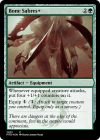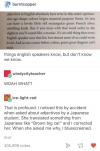Or even just: “Few in the empire are fully aware of the dangers that lurk at the edge of the continent”
In this sentence, either word can be correct. It depends what you are trying to say.
We are concerned with the noun:
dangers.
"Few in the empire are fully aware of the dangers that lurk at the edge of the continent."
Here, the description of the dangers is
necessary information to differentiate them from, say, "the dangers that burrow beneath the earth." We use "that" to restrict our description to a specific noun of the subset of potential dangers.
"Few in the empire are fully aware of the dangers, which lurk at the edge of the continent."
Here, the
only dangers on this entire continent are located at the edge of the continent. We use "which" to add information about the dangers.
In this example, I'd opt for "that," as there are other dangers around the empire that people are generally more aware of.
In the card's original text, it could say:
"There are dangers at the edge of the continent that few in the empire would appreciate."
Again, this is
necessary information to separate this subset of dangers from the subset of dangers that "few in the empire wouldn't appreciate." This sentence
only cares about the dangers which few appreciate. More appreciated dangers are not noted. Awkward differentiation, considering we're discussing dangers!
"There are dangers at the edge of the continent, which few in the empire would appreciate."
This sentence is talking about the
one location of the dangers and then adding that few would appreciate them. Still unsure who is appreciating dangers.
Or, if the comma was placed as a dramatic pause, I'd opt for
"There are dangers at the edge of the continent... few in the empire would appreciate."
I think that the main problem with the original flavor is that we are deeming some dangers worthy of appreciation and others much less so.
Card seems fine.






